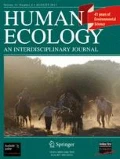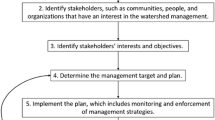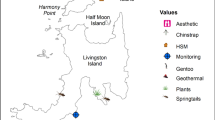Abstract
The discussion about the impact of pastoralists on ecosystems has been profoundly shaped by Hardin’s tragedy of the commons that held pastoralists responsible for overgrazing the range. Research has shown that grazing ecosystems are much more complex and dynamic than was previously assumed and that they can be managed adaptively as commons. However, proponents and critics of Hardin’s thesis continue to argue that open access to common-pool resources inevitably leads to a tragedy of the commons. A longitudinal study that we conducted of pastoral mobility and primary production in the Logone floodplain in the Far North Region of Cameroon suggest that open access does not have to lead to a tragedy of the commons. We argue that this pastoral system is best conceptualized as an open system, in which a combination of individual decision-making and coordination of movements leads to an ideal-free type of distribution of mobile pastoralists. We explain how this self-organizing system of open access works and its implications for theories of management of common-pool resources and our understanding of pastoral systems.



Similar content being viewed by others
References
Agrawal, A. (2002). Common resources and institutional stability. In Ostrom, E., Dietz, T., Dolsak, N., Stern, P. C., Stonich, S., and Weber, E. U. (eds.), The Drama of the Commons. National Academy Press, Washington, D.C., pp. 41–85.
Alvard, M. S. (1998). Evolutionary Ecology and Resource Conservation. Evolutionary Anthropology 7: 62–74.
Barth, H. (1965). Travels and Discoveries in North and Central Africa: Being a Journal of an Expedition Undertaken Under the Auspices of H.B.M.’s Government in the Years 1849–1855. Vol. I, II, and III. Frank Cass, London.
Bassett, T. J., and Turner, M. D. (2007). Sudden Shift or Migratory Drift? Fulbe Herd Movements to the Sudano-Guinean Region of West Africa. Human Ecology 35: 33–49.
Bauer, F. (2002). L’expédition Allemande Niger-Bénoué–Lac Tchad (1902–1903). Karthala, Paris.
Behnke, R. H., and Scoones, I. (1993). Rethinking range ecology: implications for rangeland management in Africa. In Behnke Jr., R. H., Scoones, I., and Kerven, C. (eds.), Range Ecology at Disequilibrium: New Models of Natural Variability and Pastoral Adaptation in African Savannas. Overseas Development Institute, London, pp. 1–30.
Bonfiglioli, A. M. (1988). Dudal: Histoire de Famille et Histoire de Troupeau Chez un Groupe de Wodaabe du Niger. Production Pastorale et Société. Cambridge University Press & Éditions de la Maison des Sciences de l’Homme, Cambridge.
Boutrais, J. (1996). Hautes Terres d’élevage au Cameroun. Vol. 1–3. Collection Études et Thèses. ORSTOM Éditions, Paris.
Bradburd, D. A. (1992). Territoriality and Iranian pastoralists: looking out from Kerman. In Casimir, M. J., and Rao, A. (eds.), Mobility and Territoriality: Social and Spatial Boundaries Among Foragers, Fishers, Pastoralists, and Peripatetics. Berg, New York, pp. 309–327.
Delclaux, F., Seignobos, C., Liénou, G., and Genthon, P. (2010). Water and people in the Yaere floodplain (North Cameroon). In Álvarez, M. A. (ed.), Floodplains: Physical Geography, Ecology and Societal Interactions. Nova publishers, Hauppauge (NY).
Dietz, T., Dolsak, N., Ostrom, E., and Stern, P. C. (2002). The drama of the commons. In Ostrom, E., Dietz, T., Dolsak, N., Stern, P. C., Stonich, S., and Weber, E. U. (eds.), The Drama of the Commons. National Academy Press, Washington, D.C., pp. 3–34.
Drent, A. K. (2005). Je suis venu pour partir… je pars parce que je suis venu (1): A Qualitative Study About Nomadic Mobility in the North of Cameroon. Thesis, Wageningen University.
Ellis, J., and Galvin, K. A. (1994). Climate Patterns and Land-Use Practices in the Dry Zones of Africa. BioScience 44: 340–349.
Ensminger, J., and Knight, J. (1997). Changing Social Norms: Common Property, Bridewealth and Clan Exogamy. Current Anthropology 18: 1–24.
Feeny, D., Berkes, F., McCay, B. J., and Acheson, J. M. (1990). The Tragedy of the Commons: 22 Years Later. Human Ecology 18: 81–103.
Fernández-Giménez, M. E., and Le Febre, S. (2006). Mobility in Pastoral Systems: Dynamic Flux or Downward Trend? International Journal of Sustainable Development & World Ecology 13: 341–362.
Fokou, G. (2010). “Tax payments, democracy and rent seeking administrators: common-pool resource management, power relations and conflicts among the Kotoko, Musgum, Fulbe and Choa Arab in the Waza-Logone floodplain (North Cameroon)”. In Haller, T. (ed.), Disputing the Floodplains: Institutional Change and the Politics of Resource Management in African Wetlands. Brill.
Frantz, C. (1986). Fulani continuity and change under five flags. In Adamu, M., and Kirk-Greene, A. H. M. (eds.), Pastoralists of the West African Savanna. Manchester University Press, Manchester (UK), pp. 16–39.
Fratkin, E., Galvin, K. A., and Roth, E. A. (eds.) (1994). African Pastoralist Systems: An Integrated Approach. Lynne Rienner publishers, Boulder (CO).
Fretwell, S. D., and Lucas, J. H. J. (1969). On Territorial Behavior and Other Factors Influencing Habitat Distribution in Birds. Acta Biotheoretica 19: 16–36.
Galaty, J. G. (1994). Rangeland tenure and pastoralism in Africa. In Fratkin, E., Galvin, K. A., and Roth, E. A. (eds.), African Pastoralists Systems: An Integrated Approach. Lynne Rienner Publishers, Boulder, CO, pp. 185–204.
Galvin, K. A. (2009). Transitions: Pastoralists Living with Change. Annual Review of Anthropology 38: 185–198.
Gifford-Gonzalez, D. (2000). Animal Disease Challenges to the Emergence of Pastoralism in Sub-Saharan Africa. African Archaeological Review 17: 95–139.
Goldschmidt, W. (1971). Independence as an Element in Pastoral Social Systems. Anthropological Quarterly 44: 132–142.
Haller, T. (ed.) (2010). Disputing the Floodplains: Institutional Change and the Politics of Resource Management in African Wetlands. African Social Studies Series. Brill, Leiden (Netherlands).
Hamilton, I. M. (2010). Foraging theory. In Westneat, D., and Fox, C. (eds.), Evolutionary Behavioral Ecology. Oxford University Press, Oxford (UK), pp. 177–193.
Hardin, G. (1968). The Tragedy of the Commons. Science 162: 1243–1248.
Homewood, K. (2008). Ecology of African Pastoralist Societies. James Currey, Oxford (UK).
Horowitz, M. M. (1986). Ideology, policy, and praxis in pastoral livestock development. In Horowitz, M. M., and Painter, T. M. (eds.), Anthropology and Rural Development in West Africa. Westview Press, Boulder (CO), pp. 251–272.
Hunn, E. S. (1982). Mobility as a factor limiting resource use in the Columbian Plateau of North America. In Williams, N., and Hunn, E. (eds.), Resource Managers: North American and Australian Hunter-Gathers. Westview Press, Boulder, pp. 17–43.
Kelly, R. L. (1995). The Foraging Spectrum: Diversity in Hunter-Gatherer Lifeways. Smithsonian Institution Press, Washington.
Lamprey, H. F. (1983). Pastoralism yesterday and today: the overgrazing problem. In Bourliere, F. (ed.), Ecosystems of the World 13: Tropical Savannas. Elsevier, Amsterdam, pp. 643–666.
Lane, C. (ed.) (1998). Custodians of the Commons: Pastoral Land Tenure in East and West Africa. Earthscan, London.
Legrosse, P. (1999). Les règles d’accès des troupeaux peuls aux pâturages du Delta central du Niger (Mali). In Niamir-Fuller, M. (ed.), Managing Mobility in African Rangelands. IT Publications, London, pp. 76–96.
McCabe, J. T. (1990). Turkana Pastoralism: A Case Against the Tragedy of the Commons. Human Ecology 18: 81–103.
McCabe, J. T. (2004). Cattle Bring Us to Our Enemies: Turkana Ecology, Politics, and Raiding in a Disequilibrium System. Michigan University Press, Ann Arbor (MI).
McCay, B. J. (2002). Emergence of institutions for the commons: contexts, situations and events. In Ostrom, E., Dietz, T., Dolsak, N., Stern, P. C., Stonich, S., and Weber, E. U. (eds.), The Drama of the Commons. National Academy Press, Washington, D.C., pp. 361–402.
McCay, B. J., and Acheson, J. M. (1987). The Question of the Commons: The Culture and Ecology of Communal Resources. Arizona Studies in Human Ecology. University of Arizona Press, Tucson (AZ).
Mobaek, R., Mysterud, A., Egil Loe, L., Holand, Ø., and Austrheim, G. (2009). Density Dependent and Temporal Variability in Habitat Selection by a Large Herbivore; an Experimental Approach. Oikos 118: 209–218.
Moritz, M., and Scholte, P. (2011). Ethical Predicaments: Advocating Security for Mobile Pastoralists in Weak States. Anthropology Today 27: 12–17.
Moritz, M., Scholte, P., and Kari, S. (2002). The Demise of the Nomadic Contract: Arrangements and Rangelands Under Pressure in the Far North of Cameroon. Nomadic Peoples 6: 124–143.
Moritz, M., Soma, E., Scholte, P., Juran, T., Taylor, L., Kari, S., and Xiao, N. (2010). An Integrated Approach to Modeling Grazing Pressure in Pastoral Systems: The Case of the Logone Floodplain (Cameroon). Human Ecology 38: 775–789.
Mouchet, J. (1960). Enquête entomologique dans le Logone et Chari (13–25 mai 1960). I: Le Foyer de glossines du Logone et Chari. II: L’Anophélisme et les possibilités de lutte antipaludique. III: La Transhumance des “Foulbé” dans les “yaéré”. IRCAM.
Mwangi, E., and Ostrom, E. (2009). Top-Down Solutions: Looking up from Africa’s Rangelands. Environment 51: 35–44.
Myers, F. R. (1982). Always ask: resource use and land ownership among Pintupi Aborigines of the Australian Western desert. In Williams, N. M., and Hunn, E. S. (eds.), Resource Managers: North American and Australian Hunter-Gatherers. Westview Press, Boulder (CO), pp. 173–195.
Niamir-Fuller, M. (1999a). Introduction. In Niamir-Fuller, M. (ed.), Managing Mobility in African Rangelands: The Legitimization of Transhumance. Intermediate technology, London, pp. 1–9.
Niamir-Fuller, M. (1999b). Towards a synthesis of guidelines for legitimizing transhumance. In Niamir-Fuller, M. (ed.), Managing Mobility in African Rangelands: The Legitimization of Transhumance. Intermediate technology, London, pp. 266–290.
Nicholson, S. E., Kim, J., and Hoopingarner, J. (1988). Atlas of African rainfall and its interannual variability. Tallahassee (FL): Department of Meteorology, The Florida State University.
Ostrom, E. (1990). Governing the Commons: The Evolution of Institutions for Collective Action. Cambridge University Press, Cambridge (UK).
Ostrom, E. (2007). A Diagnostic Approach for Going Beyond Panaceas. PNAS 104: 15181–15187.
Ostrom, E., Dietz, T., Dolsak, N., Stern, P. C., Stonich, S., and Weber, E. U. (2002). The Drama of the Commons. National Academy Press, Washington, D.C.
Peters, P. E. (1994). Dividing the Commons: Politics, Policy and Culture in Botswana. University Press Virginia, Charlottesville (VA).
Picardi, A. C., and Seifert, W. W. (1976). A Tragedy of the Commons in the Sahel. Technology Review 78: 42–51.
Poteete, A. R., Janssen, M. A., and Ostrom, E. (2010). Multiple Methods in Practice: Research on Collective Action and the Commons. Princeton University Press, Princeton (NJ).
Robinson, L. W. (2009). A Complex-Systems Approach to Pastoral Commons. Human Ecology 37: 441–451.
Ruttan, L. M., and Mulder, M. B. (1999). Are East African Pastoralists Truly Conservationists? Current Anthropology 40: 621–652.
Schlee, G. (2010). “Territorialising ethnicity: the political ecology of pastoralism in Northern Kenya and Southern Ethiopia.” In Working Paper, Vol. 121. Max Planck Institute for Social Anthropology, Halle (Germany).
Scholte, P. (2005). Floodplain Rehabilitation and the Future of Conservation and Development: Adaptive Management of Success in Waza-Logone. Leiden University, Cameroon.
Scholte, P. (2007). Maximum Flood Depth Characterises Above-Ground Biomass in African Shallowly Flooded Grasslands. Journal of Tropical Ecology 23: 63–72.
Scholte, P., Kirda, P., Adam, S., and Kadiri, B. (2000). Floodplain Rehabilitation in North Cameroon: Impact on Vegetation Dynamics. Applied Vegetation Science 3: 33–42.
Scholte, P., Kari, S., Moritz, M., and Prins, H. (2006). Pastoralist Responses to Floodplain Rehabilitation in Northern Cameroon. Human Ecology 34: 27–51.
Seignobos, C., and Iyébi-Mandjek, O. (eds.) (2000). Atlas de la Province Extrême-Nord Cameroun. IRD & MINREST, Paris.
Seignobos, C., and Jamin, F. (2003). La Case Obus: Historie et Reconstitution. Patrimoime sans frontière, Marseille (France).
Sinclair, A. R. E., and Fryxell, J. M. (1985). The Sahel of Africa: Ecology of a Disaster. Canadian Journal of Zoology 63: 987–994.
Stenning, D. J. (1957). Transhumance, Migratory Drift, Migration; Patterns of Pastoral Fulani Nomadism. The Journal of the Royal Anthropological Institute of Great Britain and Ireland 87: 57–73.
Sutherland, W. J. (1996). From Individual Behaviour to Population Ecology. Oxford University Press, Oxford.
Swallow, B. M. (1990). Strategies and Tenure in African Livestock Development. LTC Paper #140. Land Tenure Center, University of Wisconsin, Madison, Wisconsin.
Turner, M. D. (1999). The role of social networks, indefinite boundaries and political bargaining in maintaining the ecological and economic resiliency of the transhumance systems of Sudano-Sahelian West Africa. In Niamir-Fuller, M. (ed.), Managing Mobility in African Rangelands. IT Publications, London, pp. 97–123.
Acknowledgments
This research has been supported by the National Science Foundation (BCS-0748594), the National Geographic Society (8306-07), and the Division of Social and Behavioral Sciences and the Anthropology Department at the Ohio State University. We want to thank the Ministry of Scientific Research and Innovation (MINRESI), the Ecole de Faune de Garoua, and the University of Maroua for granting research permission and research affiliation. Paul Maddock and Qian Hao made the maps, Kristen Ritchey conducted structured interviews in 2009, and CARPA research assistants Oumarou Kari, Haman Wabi, and Sali Siddiki collected much of the spatial data. We would like to thank Monique Borgerhoff Mulder, Endre Nyerges, and the reviewers for critical comments on earlier versions of this article.
Author information
Authors and Affiliations
Corresponding author
Rights and permissions
About this article
Cite this article
Moritz, M., Scholte, P., Hamilton, I.M. et al. Open Access, Open Systems: Pastoral Management of Common-Pool Resources in the Chad Basin. Hum Ecol 41, 351–365 (2013). https://doi.org/10.1007/s10745-012-9550-z
Published:
Issue Date:
DOI: https://doi.org/10.1007/s10745-012-9550-z




